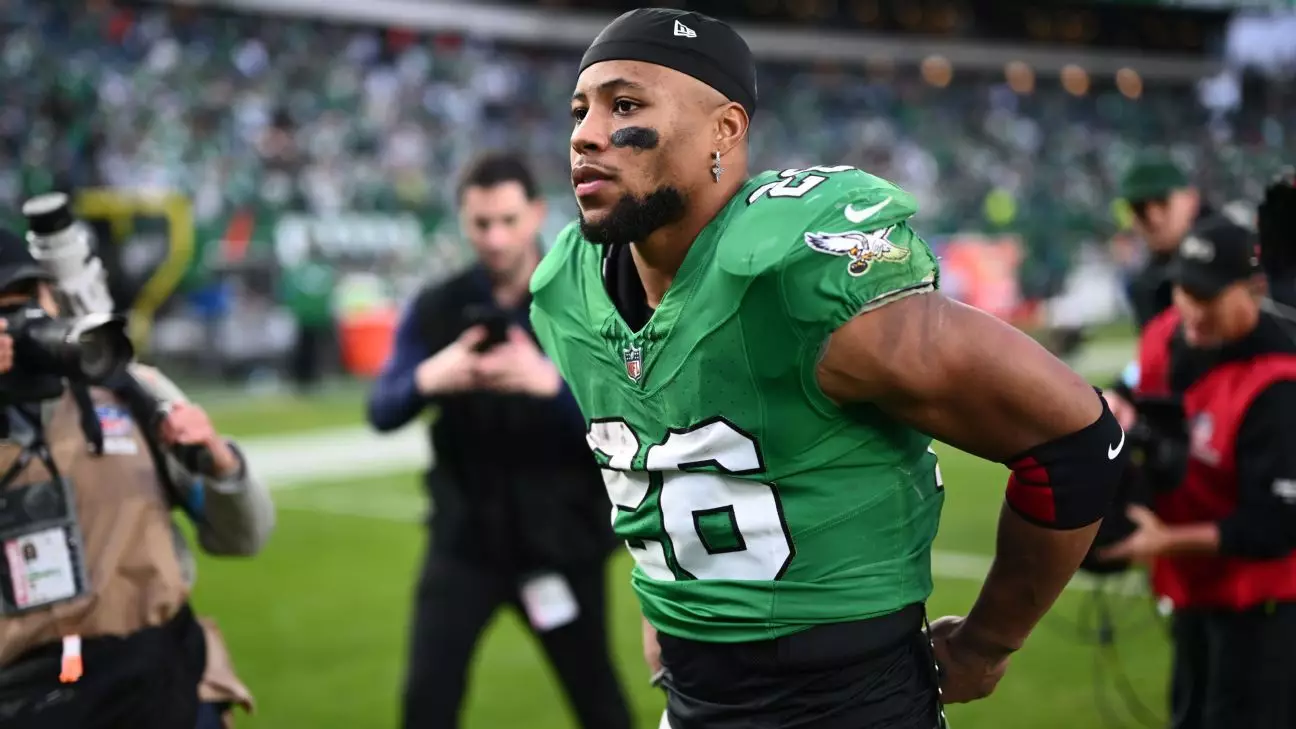As the NFL regular season draws to a close, teams are often faced with balancing immediate aspirations and long-term objectives. For the Philadelphia Eagles, the conundrum rests squarely on the shoulders of head coach Nick Sirianni. With the Eagles already having clinched the NFC East title and securing the second seed in the playoffs, the final regular-season game against the New York Giants presents an interesting scenario. One key factor in this equation is Saquon Barkley, a remarkable running back who stands on the precipice of NFL history, needing just 101 yards to eclipse Eric Dickerson’s long-standing single-season rushing record of 2,105 yards, set in 1984.
This situation is not merely a matter of statistics; it encapsulates a broader conversation about player welfare, team strategy, and the overarching ethos of competitive sports. Sirianni’s inclination to consult various voices within the organization, including players, general manager Howie Roseman, and owner Jeffrey Lurie, indicates the significance of this decision. He must weigh the potential benefits of allowing Barkley to chase a record against the risks of injuries and fatigue as the playoffs loom.
Team vs. Individual Aspirations
In modern sports, the delicate equilibrium between individual accomplishment and team objectives is becoming increasingly pronounced. Sirianni emphasized this during his weekly media appearance, clarifying that while his primary focus remains on what is best for the Eagles as a collective, the personal aspirations of players cannot be disregarded. The critical question arises: at what cost does an individual’s pursuit of greatness come?
While the excitement surrounding Barkley’s potential record-breaking run is palpable, the reality is that preserving the health of the team’s core players heading into the playoffs is paramount. Sirianni’s past decisions, such as opting to play wide receiver DeVonta Smith in the 2021 season finale to secure his rookie receiving record, illustrate that he understands the gravity of such nuances. However, he has also learned that each scenario is unique, demanding its own tactical approach.
Should Sirianni choose to field Barkley and let him chase the record, it sets a precedent that prioritizes individual accolades even within the team’s already secured position in the playoffs. Conversely, resting players could send a message that protecting player health and optimizing playoff readiness takes precedence over personal milestones. The Eagles come into the contest in a favorable position, but the allure of glory for Barkley could cloud the judgment for some involved in the decision-making process.
Barkley’s perspective is equally noteworthy. He has publicly expressed his willingness to support whatever decision Sirianni makes, signifying an admirable understanding of the team-first mentality. His words reflect a maturity that indicates he values the collective goal of achieving playoff success over personal records. However, the ruling on how to proceed may hinge not just on Barkley’s desire but also on the coaching staff’s assessment of the team’s overall well-being and competitiveness.
As the Eagles prepare for their playoff journey, all eyes will remain on Sirianni’s announcement regarding Barkley’s and other starters’ status. This pivotal choice could reverberate through the organization and the league, potentially reshaping discussions surrounding player management as the NFL evolves. Ultimately, the Eagles’ scenario illustrates the complexity faced by franchises striving for excellence while respecting individual player ambitions—a true measure of leadership in professional sports.
Whatever the decision may be, it will resonate beyond the gridiron, serving as a case study for team dynamics in an age where player agency and competitive viability must coexist. In a sport characterized by physicality and unpredictability, ensuring the right balance will likely dictate the Eagles’ path in the postseason and beyond.

